Trump impeachment: US House ready for historic vote
- Published
Trump has been impeached - how did we get here?
Donald Trump is expected to become only the third US president to be impeached by the House of Representatives.
Democratic lawmakers are preparing to approve two impeachment charges against the Republican president.
Mr Trump would then face a Senate trial next month, but members of his party control that chamber and are unlikely to remove him from office.
The president has called the process an "attempted coup" and a "scam".
In a six-page letter to the Democratic Speaker of the House, Nancy Pelosi, on the eve of the vote, the 45th president of the United States argued he had been treated worse than "those accused in the Salem witch trials".
Mrs Pelosi described the letter as "really sick".
As debate got under way in the House, President Trump was due to fly to Battle Creek, Michigan, for a "Merry Christmas" rally along with Vice-President Mike Pence.
Meanwhile, Secretary of State Mike Pompeo told reporters he would be happy to testify and produce documents for a Senate trial of Mr Trump "if that's appropriate and required by law".
What has happened in the House so far?
At midday local time (1700 GMT) on Wednesday, members of the House began six hours of debate on the matter. They are expected to vote on both articles of impeachment afterwards.
In her opening remarks Ms Pelosi said it was "tragic" that the president's "reckless actions" had led to impeachment but said he had left lawmakers with "no choice".
"The president is an ongoing threat to our national security, and the integrity of our elections, the basis of our democracy," she said.
"President's reckless actions make impeachment necessary" - House Speaker Nancy Pelosi
But Republicans hit back. Lawmaker Doug Collins from Georgia said Mr Trump had done "nothing wrong" and that Democrats wanted to impeach him because they were afraid to face him in next year's election.
"They said we can't beat him if we don't impeach him. The American people will see through this," he said.
Meanwhile Debbie Lesko, a Republican from Arizona, said it was the "most partisan impeachment" in US history.
Surveys suggest the country is split on the process. US political website FiveThirtyEight's collection of national polls, external shows just over 47% back impeachment, while 46.4% oppose it.
"Pontius Pilate afforded more rights to Jesus than the Democrats have afforded this president"
How will the vote play out?
The vote in the Democratic-controlled House is expected to fall almost entirely along party lines.
Nearly 200 Republicans are united in opposition, except for one lawmaker, Florida's Francis Rooney, who is retiring and has not ruled out siding with Democrats.
All but a handful of the 233 House Democrats have said they will back impeachment - about 216 votes are needed for the measure to pass by a simple majority in the lower chamber of Congress.
The yeses include most of the 31 Democratic lawmakers who represent districts won by Mr Trump in 2016.
Collin Peterson, of Minnesota, and Jeff Van Drew, of New Jersey, have indicated they will vote no. Mr Van Drew plans to become a Republican.
Jared Golden, of Maine, said he would vote to impeach on one charge, not both.
What are the charges?
The House Judiciary Committee approved two articles of impeachment against Mr Trump last week.
The first is abuse of power. It accuses the president of trying to pressure Ukraine to smear his political rival, Democratic presidential contender Joe Biden.
Mr Trump and his conservative allies have alleged without evidence that while he was US vice-president, Joe Biden encouraged Ukraine to fire its top prosecutor in order to stop him investigating a Ukrainian gas company that employed his son, Hunter Biden, as a board member.
A beginner's guide to impeachment and Trump
Democrats say Mr Trump dangled $400m of US military aid and the prospect of a coveted White House meeting for Ukrainian President Volodymyr Zelensky as bargaining chips to prod the US ally into announcing a corruption inquiry into the Bidens.
The second charge is obstructing Congress. Mr Trump, who blocked his aides from testifying, is accused of failing to co-operate with the House impeachment investigation.
The president has denied withholding US aid to benefit himself politically and maintains it was appropriate to ask Ukraine to look into alleged corruption.
Under the US constitution, a president "shall be removed from office on impeachment for, and conviction of, treason, bribery, or other high crimes or misdemeanours". It is a political process, not a legal one.
What will happen in the Senate?
Once Mr Trump is formally impeached by the House as expected, proceedings will go on to the Republican-controlled Senate for a trial in January.
If two-thirds of senators voted to convict the president, he would be removed from office. But Democrats can only muster 47 votes in the 100-seat upper chamber, and they need 67 to pass the measure.
No-one expects at least 20 of Mr Trump's fellow Republicans to join with Democrats and end his presidency.
Senate Republican leader Mitch McConnell said on Tuesday he was under no obligation to be even-handed in his management of the proceeding.
"I'm not an impartial juror," the Kentucky senator told reporters. "This is a political process. I'm not impartial about this at all."
Mr McConnell rebuffed calls from the Senate's Democratic leader, Chuck Schumer, to summon top White House officials for the trial.
What is the precedent?
Two US presidents have been impeached - Andrew Johnson in 1868 and Bill Clinton in 1998 - but in both cases the Senate did not vote to force them from office.
Richard Nixon resigned the presidency in August 1974 when it became clear he would be impeached and ousted by Congress in the wake of the Watergate scandal.
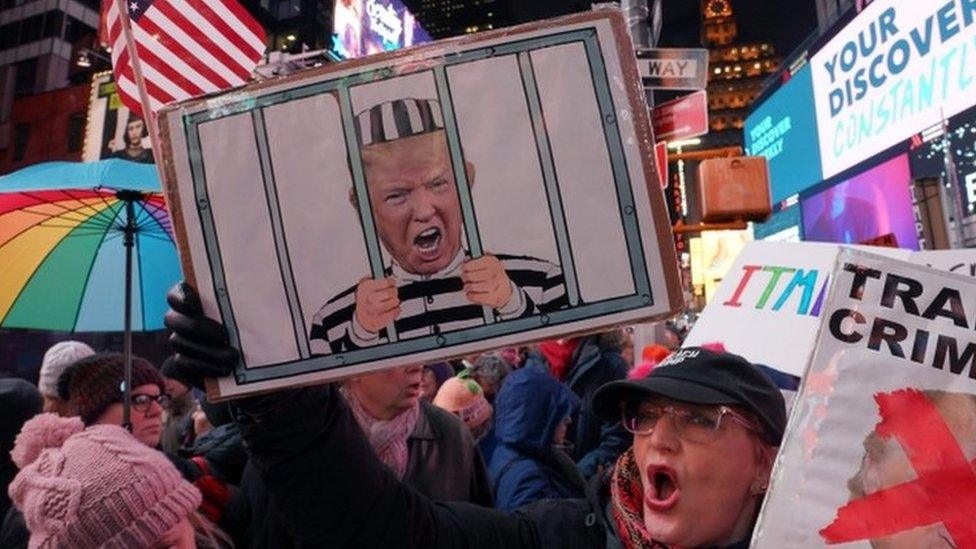
Groups of demonstrators in favour of Mr Trump's impeachment rallied in major cities across the US on Tuesday
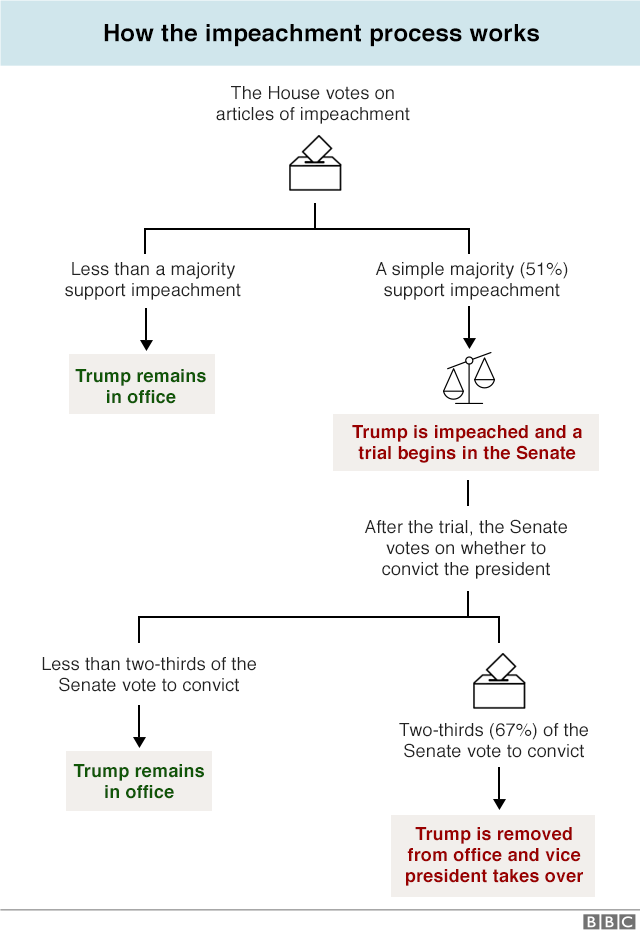


Want to find out more?

A SIMPLE GUIDE: If you want a basic take, this one's for you
GO DEEPER: Here's a 100, 300 and 800-word summary of the story
WHAT'S IMPEACHMENT? A political process to remove a president
VIEW FROM TRUMP COUNTRY: Hear from residents of a West Virginia town
CONTEXT: Why Ukraine matters to the US
FACT-CHECK: Did Ukraine interfere in the 2016 election to help Clinton?
CASE FOR & AGAINST: What legal scholars say about Trump conduct

- Published1 February 2020
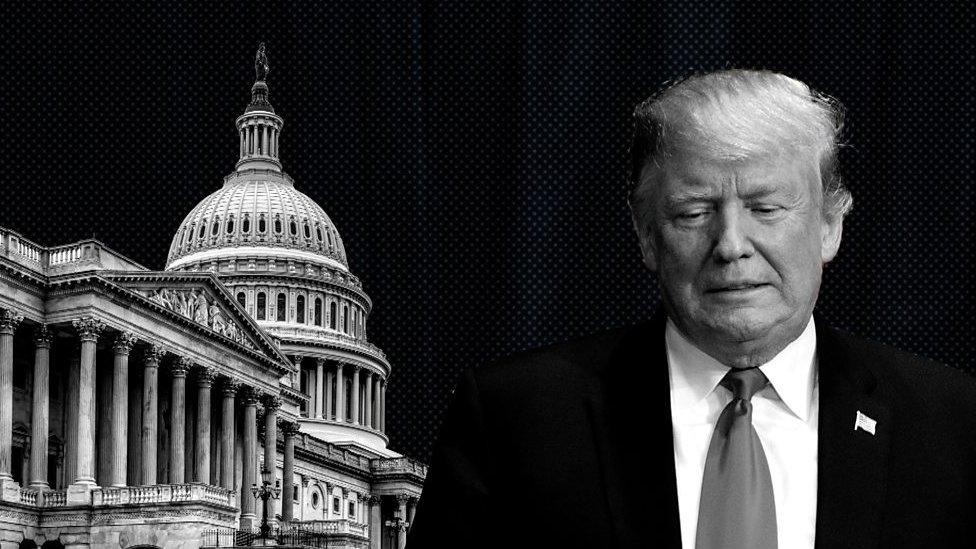
- Published16 December 2019
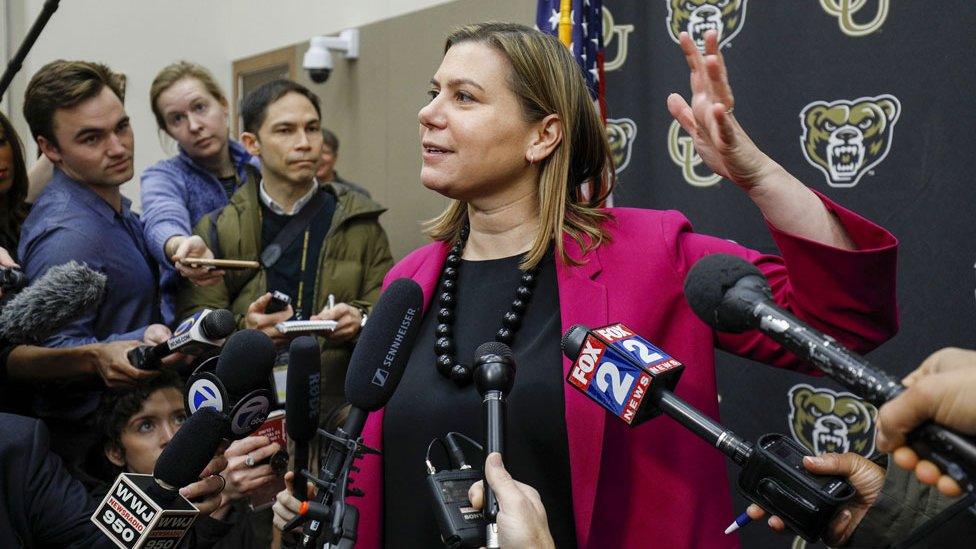
- Published13 December 2019
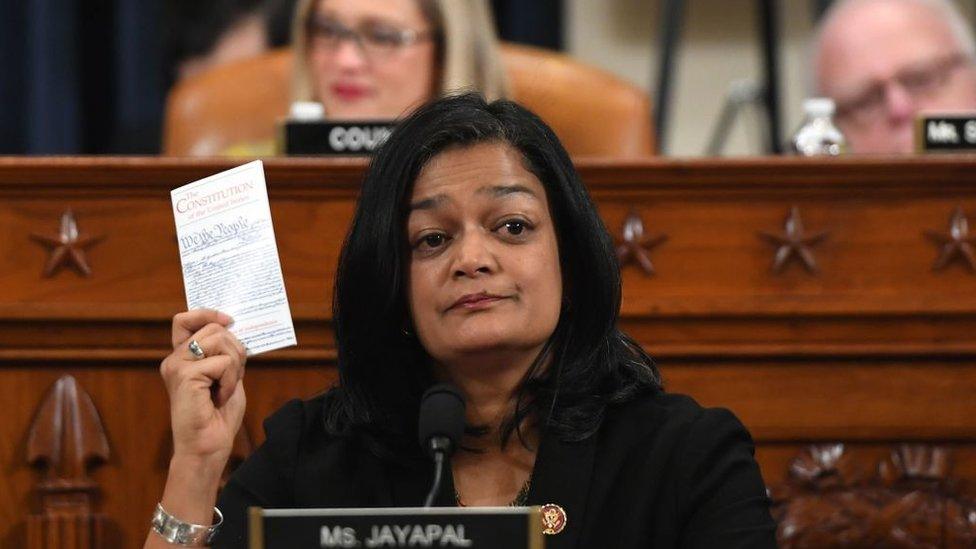
- Published12 November 2019
